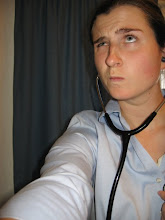Mother Teresa - An example of the potential of humanity when we give up all our trivial and selfish pursuits and allow ourselves to merely be a channel of God's love to those around us.
 (picture from google image search)
(picture from google image search)Dr. Paul Farmer - A passionate advocate for the health and well-being of the poor.
 (Dr. Paul Farmer examining an AIDS patient. From Google image search)
(Dr. Paul Farmer examining an AIDS patient. From Google image search)
Bono - I dislike his music and I know nothing of his personal life, but I think he is an example of how fame and fortune can be used to for good by directing attention to of the public to larger political issues concerning the developing world.
(Bono, speaking at the World Economic Forum as a proponent of canceling third world debt. From Google image search).
My College Professors - Often under appreciated and underpaid, they work tirelessly to teach students skills, such as writing, as well as how to discover answers to questions and larger issues on their own. By making a small difference in many people, they are making an essential improvement in the world.
My favorite professors at my, 'congratulations for getting into medical school party.' (However, I think that the above heroes category should also include all my other Skagit professors and my professors from the various universities I have attended).
My Mom - Also often under appreciated, she has dedicated her life to raising and educating her 13 children and helping them become the best people they can be.
 My mom is in the middle of of this picture. The children in the picture are (from left to right, back row first): Paul (likes building Legos and writing science fiction), Peter (adopted from Russia and a really hard worker), Gene (adopted from Russia and a helpful boy who can make silly voices) , Sarah (can already cook apple crisp and happens to be a genius at math and science), Rachel (adopted from the US and a really good little helper who has been able to sing on pitch and harmonize since the age of 5), Monica (now 4 years old, she was adopted from Guatemala and has a lot of energy which she applies well in gymnastics class) and Anne (in a wheelchair and the sweetest little sister in the whole wide world). The children missing from the picture are: Aaron (physics genius, math genius, music genius, literature genius, spelling genius, and philosophy genius who also happens to be a really nice guy), myself (probably about to fail out of medical school), Kalkidan (adopted from Ethiopia and a really cute hard worker who pronounces English better than most Americans), Tadele (adopted from Ethiopia and soccer star), Berhanu (adopted from Ethiopia and soccer star), and Tesfaye (adopted from Ethiopia and soccer star). Uh, did I miss anyone?
My mom is in the middle of of this picture. The children in the picture are (from left to right, back row first): Paul (likes building Legos and writing science fiction), Peter (adopted from Russia and a really hard worker), Gene (adopted from Russia and a helpful boy who can make silly voices) , Sarah (can already cook apple crisp and happens to be a genius at math and science), Rachel (adopted from the US and a really good little helper who has been able to sing on pitch and harmonize since the age of 5), Monica (now 4 years old, she was adopted from Guatemala and has a lot of energy which she applies well in gymnastics class) and Anne (in a wheelchair and the sweetest little sister in the whole wide world). The children missing from the picture are: Aaron (physics genius, math genius, music genius, literature genius, spelling genius, and philosophy genius who also happens to be a really nice guy), myself (probably about to fail out of medical school), Kalkidan (adopted from Ethiopia and a really cute hard worker who pronounces English better than most Americans), Tadele (adopted from Ethiopia and soccer star), Berhanu (adopted from Ethiopia and soccer star), and Tesfaye (adopted from Ethiopia and soccer star). Uh, did I miss anyone?
After my trip to East Africa, I think I need to make an addition to my list of heroes:
Pastor Haffermann - Exhibiting many of the same qualities as Mother Teresa, he has dedicated the later years of his life to being an advocate for the Maasai people in central Tanzania.
(see blog entries in Feb and March)
Now, I would like to add another hero:
Milly - A very brave and kind woman who generously donated her body so that my 3 lab partners and I could learn anatomy from her.
Of course, Milly isn't her real name. Last week we decided that she seemed like a 'Milly' to us, so we named her. (I have noticed that students tend to give their cadavers nickname-ish type names or other names that demonstrate closeness such as 'Milly' or 'Betty.' I think this might be because we feel like we get to know our cadavers so well during the long hours we spend dissecting, that only a nickname seems fitting). All we really know about Milly is that she died when she was in her early 80's and her cause of death. I also know that Milly was somebody that cared about the world - even in her death she wanted to make the world a better place. It must have been a huge sacrifice for Milly to donate her body. Instead of her children being able to visit her grave where she would have been buried next to her husband, she lies in a room in the UW campus, slowly being cut apart each week by 4 students who really don't know what they are doing. She has no secrets before us. She was willing to do that for our education.
















